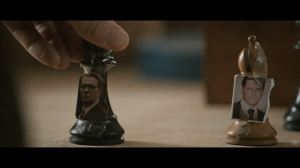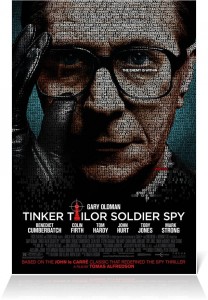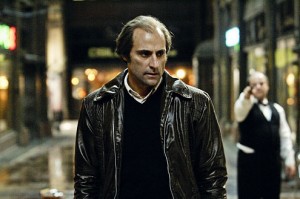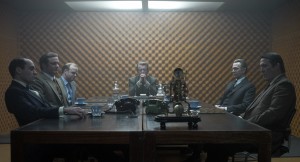Dir: Thomas Alfredson
Stars: Gary Oldman, Colin Firth, Tom Hardy, Benedict Cumberbatch, Ciaran Hinds, Toby Jones and Stephen Graham
Apparently, there’s an old British children’s song that goes something like this –
Tinker, tailor, soldier, sailor
Rich man, poor man, beggar man, thief
The only reason I possibly know that is because this was the first LeCarre novel I ever read, and it’s on the page after the dedication, I believe… I remember my Dad looking at me curiously when I was asking him for a great espionage thriller. He said something like, “you’re all done with Fleming, huh?” referring to the Bond series – and I did love those books. Regardless, I nodded eagerly and he surveyed his library and brought down Tinker. He said something to the effect of, “this is kind of a tough read, but I think you’ll agree that le Carre is a master.” Later he’d give me others, including Ludlum’s greats, which are for another entry.
A master le Carre is indeed. I’ve not only read the novel, but I watched the entire BBC miniseries from the late 1970s, which starred Alec Guiness (who played Obi Wan Kenobi in the original Star Wars series, if that helps you). I remember with the novel having to re-read several sections just to be sure I was following what happened. I experienced that same phenomenon with the mini-series. Perhaps it was the heavy British accents or the complexity of the story, but I don’t mind admitting that I had to rewind and watch some scenes and dialogue exchanges several times.
All of this prelude is not meant to discourage you from seeing the movie, but rather to forewarn you that this is an intricate plot with countless characters and many “moving parts.” I’m not even sure we’re meant to understand it all. Instead, I think that the director – of the film version I mean – intended for us to appreciate the lifestyle and level of stress that these agents experience. I mean, we all have a job and there’s stress involved in that job. But I think part of what drives me to Tinker – and stories like it, by the way – is that the picture painted conveys not only fear of one’s enemy, but legitimate fear of one’s friends.
The story, if I can be so bold as to suggest a synopsis, concerns an early 1970s British master spy named “Control,” who runs the “Circus” in London, which is the British equivalent of the American CIA. Naturally, their primary concern given this time and setting is the Russian contingent and trying to avoid a nuclear World War III. It seems “Control” (William Hurt) has an awful suspicion that one of his top intelligence men is actually a Russian spy – and has been feeding sensitive information to the Russians for years! He shares this information with a top spy named Jim Prideaux, played by Mark Strong, whose mission is to go to Hungary and somehow put the chess pieces in place to unmask this mole.
 The key is that “Control” has taped the photographs of his top intelligence men to chess pieces: Percy Alliline (Toby Jones), who seems in the top position to succeed “Control” once the old man retires, is nicknamed “Tinker.” The well dressed, womanizing Bill Haydon (Colin Firth) is dubbed, “Tailor.” Roy Bland (Ciaran Hinds) is called “Soldier,” while Toby Esterhaze (David Dencik) is called “Poor Man” to avoid confusion with saying, “Sailor.” With great hesitation and sadness, “Control” reveals “Beggar man” to be his right hand man and “friend,” George Smiley.
The key is that “Control” has taped the photographs of his top intelligence men to chess pieces: Percy Alliline (Toby Jones), who seems in the top position to succeed “Control” once the old man retires, is nicknamed “Tinker.” The well dressed, womanizing Bill Haydon (Colin Firth) is dubbed, “Tailor.” Roy Bland (Ciaran Hinds) is called “Soldier,” while Toby Esterhaze (David Dencik) is called “Poor Man” to avoid confusion with saying, “Sailor.” With great hesitation and sadness, “Control” reveals “Beggar man” to be his right hand man and “friend,” George Smiley.As it turns out, “Control” and Smiley are fired from their Intelligence jobs for how terribly the Jim Prideaux mission goes: I’ll let you watch the movie to see the details.
 But going back to a point I made earlier, the film is a tough watch because these characters lead a stressful, urgent and fearful life. Eventually, Smiley is commissioned to find “Control’s” mole: you can’t help but feel extremely depressed as Smiley is forced to ask friends and colleagues terribly difficult questions, bear his own personal secrets, ask colleagues he barely knows to risk their life for him and ask other colleagues to go risk their lives AGAIN. As an example, one of the more stressful scenes involves a guy merely trying to get a file out of a building! The overall feeling and tone of the film that results is what feels like a terribly authentic depiction of what the espionage lifestyle is actually like.
But going back to a point I made earlier, the film is a tough watch because these characters lead a stressful, urgent and fearful life. Eventually, Smiley is commissioned to find “Control’s” mole: you can’t help but feel extremely depressed as Smiley is forced to ask friends and colleagues terribly difficult questions, bear his own personal secrets, ask colleagues he barely knows to risk their life for him and ask other colleagues to go risk their lives AGAIN. As an example, one of the more stressful scenes involves a guy merely trying to get a file out of a building! The overall feeling and tone of the film that results is what feels like a terribly authentic depiction of what the espionage lifestyle is actually like.In other words, the life of James Bond it is NOT. No, instead it’s hiding and fearing eventual torture if you’re captured in a foreign country by Russian agents. It’s worrying about your wife leaving you. It’s concern over one of your incompetent colleagues messing up – read: killing someone in the field – to get ahead and take your spot for promotion. It’s living in hiding in a “caravan” near a boys school to stay unidentified since you’re supposed to be dead – and you really don’t feel like being interrogated by the very government that betrayed you!
 I really hope you read the above and use it as a guide if you see this film – or see it again. It’s a bold choice by the director to simply dive into the story and put the onus on the audience to pay attention and try and remember who’s who and what their motivation is. It’s a choice I respect, and yet, it doesn’t make Tinker an “easy watch.” In fact, it reminded me of Michael Mann’s film version of Miami Vice a few years back, and how in the midst of a very complicated story, he also threw us the curve ball of the Gong Li character, who was (to me at least) difficult to understand. While this choice made the film more authentic – as in, how hard would it be for Crockett to get information from her? – it also made it hard to watch!
I really hope you read the above and use it as a guide if you see this film – or see it again. It’s a bold choice by the director to simply dive into the story and put the onus on the audience to pay attention and try and remember who’s who and what their motivation is. It’s a choice I respect, and yet, it doesn’t make Tinker an “easy watch.” In fact, it reminded me of Michael Mann’s film version of Miami Vice a few years back, and how in the midst of a very complicated story, he also threw us the curve ball of the Gong Li character, who was (to me at least) difficult to understand. While this choice made the film more authentic – as in, how hard would it be for Crockett to get information from her? – it also made it hard to watch!All the above aside, I really love this film. In fact, I loved the mini-series and the book, too. While this blog is dedicated to cinema only, it’s worth mentioning that each version of the Tinker story is phenomenal espionage storytelling in its own medium.



